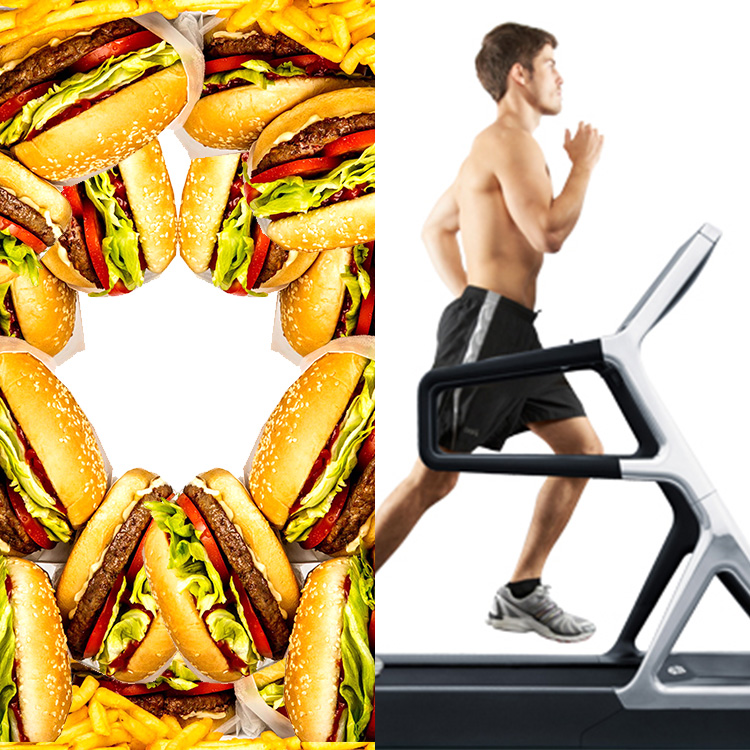You wake up in the morning and toss back a high-sugar energy drink and some pastries. After all, you’re logging three to five 30-plus-minute cardio sessions a week, on top of lifting. That should be enough to burn off those extra calories. Right?
At lunchtime, you have a spinach and chicken salad, which seems like a pretty smart food choice to help you hit your calorie goal for the day. But you splurge on a biggie-sized soda and monster-sized chocolate chip cookie. And with every bite, you’re thinking, “I might have to do a little more cardio to make up for this.”
By the time you’re ready for bed, you’ve munched your way through a few more unhealthy snacks, gobbled half a pizza for dinner, and topped it off with some ice cream.
When you check on your calorie goal for the day, you realize you’re over the limit. So you make up your mind to log more cardio and level up the intensity to make up for it.
Stop right there.
You can’t out exercise a bad diet.[1] No amount of cardio or exercise can make up for making crappy food choices.
Too Much Sugar = Fat Storage and Hunger
If your daily diet looks anything like the above example, you’re probably eating too much sugar. It’s going to be tough to hit your calorie and macro goals when you do this.
And even if you manage to log a grueling cardio session that burns 1,000 calories, it doesn’t change the fact that “sugar calories promote fat storage and hunger,” says Dr. Aseem Malhotra, a physician and researcher with the UK's Academy of Medical Royal Colleges.
Trying to get rid of that layer of fat covering your abs? Hoping to shed your back fat or love handles to get that V-shaped sculpted look? Even with a ton of cardio, it’s going to be tough to do if your diet is a mess.
Poor Food Choices Interfere with Progress
If you’re eating all the wrong foods and hoping more cardio can help you justify more burgers and fries instead of cooking at home, you’re wrong.
Food is fuel. If you want to build muscle, shed fat, and elevate your metabolism, you need to eat the right foods. It’s why following a daily calorie and macronutrient goal is so important.
And I’d argue it’s even more important than logging miles on the treadmill or lifting weights to lower your Body Mass Index, reduce fat, and achieve your physique goal.
Excess Cardio Taps Muscle Mass
More cardio to make up for a bad diet is a pretty common misconception out there. Maybe you really blow your diet on a cheat day and decide you need to log two or three hours of cardio work to make up for it.
It’s a losing battle. Yes, cardio does help burn calories and fat…to a point. And it makes sense to focus on cardio if your primary goal is getting better at endurance activities like swimming, cycling or running.
But if your end-game is building muscle strength and size, too much cardio can actually be counterproductive to your goal. In fact, doing too much cardio can actually tap muscle mass for energy, slow metabolism, and put growth and fat loss on hold.[2]
Bad Diet = Low Energy Levels
Ever wonder why you feel tired and sluggish, you skip workouts, or load up on caffeinated drinks to get by? It’s probably your diet.
If you’re not getting the nutrients you need from healthy food to support your exercise goals, you’re going to feel tired and fatigued. You’re more likely to experience the blues, get sick, and develop other health problems.[3]
Fortunately, eating the right foods and in the right amounts, can make a difference. It’s why following a meal plan with daily calorie and macronutrient goals is so important.
Your diet can have an impact on making gains in the gym, as well as your energy levels, sleep quality, ability to cope with stress, improve your mood, support digestion, and protect your health.
So what should you be eating?
There’s nothing wrong with a little dessert or sweet treat now and then. Just check out my list of healthier, lower-calorie recipes.
But junk food and sugary snacks shouldn’t make up the bulk of your diet. And if it does, more cardio isn’t going to cut it.
If you really want to build muscle, shred fat, and transform your body, getting enough protein, eating plenty of fruits and vegetables, and getting the right amount of calories and macros (protein, fats, and carbs), along with drinking plenty of water will make a big difference.
Get your diet right, and 30 minutes of cardio a few times a week, combined with strength training will help you get the results you want a lot faster than more miles on the treadmill.
Looking for a meal plan to help you get results? Check out my 8 and 12-week customized training and nutrition plans designed to help you build muscle, shred fat, and transform your body.
References
- Mahhotra, A., et al. (2015). It is time to bust the myth of physical inactivity and obesity: you cannot outrun a bad diet. British Journal of Sports Medicine. From: bjsm.bmj.com/content/early/2015/05/07/bjsports-2015-094911
- Willis, L., et al. (2012). Effects of aerobic and/or resistance training on body mass and fat mass in overweight or obese adults. Journal of Applied Physiology. https://www.ncbi.nlm.nih.gov/pmc/articles/PMC3544497.
- Sarris, J. (2015). Nutritional medicine as mainstream in psychiatry. Lancet Psychiatry. https://www.ncbi.nlm.nih.gov/m/pubmed/26359904.

